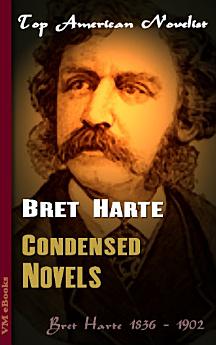Condensed Novels: Top American Novelist
About this ebook
When I state that I was own brother to Lord Burleydon, had an income of two thousand a year, could speak all the polite languages fluently, was a powerful swordsman, a good shot, and could ride anything from an elephant to a clotheshorse, I really think I have said enough to satisfy any feminine novel-reader of Bayswater or South Kensington that I was a hero. My brother's wife, however, did not seem to incline to this belief.
"A more conceited, self-satisfied little cad I never met than you," she said. "Why don't you try to do something instead of sneering at others who do? You never take anything seriously—except yourself, which isn't worth it. You are proud of your red hair and peaked nose just because you fondly believe that you got them from the Prince of Trulyruralania, and are willing to think evil of your ancestress to satisfy your snobbish little soul. Let me tell you, sir, that there was no more truth about that than there was in that silly talk of her partiality for her husband's red-haired gamekeeper in Scotland. Ah! that makes you start—don't it? But I have always observed that a mule is apt to remember only the horse side of his ancestry!"
Ratings and reviews
About the author
Francis Bret Harte (August 25, 1836 – May 5, 1902) was an American author and poet, best remembered for his short fiction featuring miners, gamblers, and other romantic figures of the California Gold Rush. In a career spanning more than four decades, he wrote poetry, fiction, plays, lectures, book reviews, editorials, and magazine sketches in addition to fiction. As he moved from California to the eastern U.S. to Europe, he incorporated new subjects and characters into his stories, but his Gold Rush tales have been most often reprinted, adapted, and admired.
Harte moved to California in 1853, later working there in a number of capacities, including miner, teacher, messenger, and journalist. He spent part of his life in the northern California coastal town of Union (now Arcata), a settlement on Humboldt Bay that was established as a provisioning center for mining camps in the interior.
The Wells Fargo Messenger, July 1916, relates that after an unsuccessful attempt to make a living in the gold camps, he signed on as a messenger with Wells Fargo & Co. Express. He guarded treasure boxes on stagecoaches for a few months, then gave it up to become the schoolmaster at a school near Sonora. He created his character Yuba Bill from his memory of an old stagecoach driver.
The 1860 massacre of between 80 and 200 Wiyots at the village of Tuluwat was well documented historically and was reported in San Francisco and New York by Harte. When serving as assistant editor for the Northern Californian, Harte editorialized about the slayings while his boss, Stephen G. Whipple, was temporarily absent, leaving Harte in charge of the paper. Harte published a detailed account condemning the event, writing, "a more shocking and revolting spectacle never was exhibited to the eyes of a Christian and civilized people. Old women wrinkled and decrepit lay weltering in blood, their brains dashed out and dabbled with their long grey hair. Infants scarcely a span long, with their faces cloven with hatchets and their bodies ghastly with wounds." After he published the editorial his life was threatened, and he was forced to flee one month later. Harte quit his job and moved to San Francisco, where an anonymous letter published in a city paper is attributed to him, describing widespread community approval of the massacre. In addition, no one was ever brought to trial, despite the evidence of a planned attack and references to specific individuals, including a rancher named Larabee and other members of the unofficial militia called the Humboldt Volunteers.







